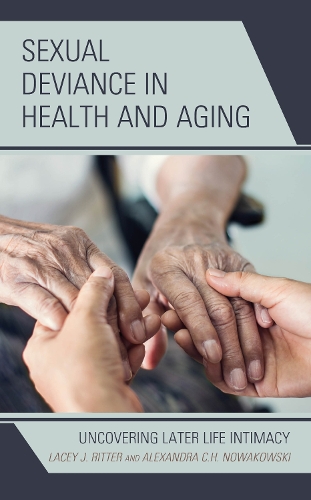
Sexual Deviance in Health and Aging: Uncovering Later Life Intimacy
(Hardback)
Publishing Details
Sexual Deviance in Health and Aging: Uncovering Later Life Intimacy
By (Author) Lacey J. Ritter
By (author) Alexandra C.H. Nowakowski
Bloomsbury Publishing PLC
Lexington Books
2nd December 2020
United States
Classifications
Professional and Scholarly
Non Fiction
Gender studies: trans, transgender people and gender variance
Health, illness or addiction: social aspects
Sex and sexuality, social aspects
302.542
Physical Properties
Hardback
134
Width 166mm, Height 241mm, Spine 15mm
345g
Description
Sexual Deviance in Health and Aging: Uncovering Later Life Intimacy explores life course health experiences and unmet care needs of populations perceived as sexually deviant in the United States. These groups include but are not limited to: gay, lesbian, and bisexual people; asexual and demisexual people; trans, nonbinary, and gender nonconforming people; intersex people; nonmonogamous and polyamorous people; kink and fetishism practitioners; sex and adult entertainment workers; individuals labeled as sexual offenders and predators; people living with sexually transmitted infections; people identifying as neuroatypical and/or autistic; and people with chronic conditions and disabilities who lead active sexual lives. Lacey J. Ritter and Alexandra C.H. Nowakowski analyze the social, cultural, and political origins of perceptions of these groups as sexually deviant. In the process, they provide history and context for the health care experiences of people within each of these broad groups. Simultaneously, Sexual Deviance in Health and Aging highlights the complexity and individuality of different peoples journeys through sexuality in health and aging.
Reviews
Sexual Deviance in Health and Aging covers an impressively wide range of sexual behaviors and tackle important topics that have received little attention in health and aging research. The authors conduct thorough reviews of narrative and ethnographic studies to provide engaging discussions about various sexuality groups health and aging experiences and unmet needs. Taking a constructionist perspective, they brilliantly highlight how certain sexual behaviors come to be perceived as deviant and what consequences it creates for health and aging experiences of people who engage in those behaviors. The book is a must read for any students, researchers, clinicians, and policy makers interested in sexualities, health, and aging.
-- Koji Ueno, Florida State UniversityAuthor Bio
Lacey J. Ritter is assistant professor in sociology and womens and gender studies at Wingate University.
Alexandra Xan C.H. Nowakowski is assistant professor in geriatrics and behavioral sciences and social medicine at Florida State University.
